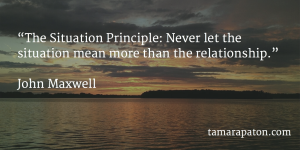

Two years ago this week, I began writing this blog. Initially, my weekly posts highlighted paths to success and lessons learned. I soon found, however, that readers responded most enthusiastically when I revealed disappointments and darker moments.
Until now, I have kept my most significant rough patch to myself. The issue was not a brief hiccup, but rather a lengthy slide. It was brought on by a tense relationship with a colleague that turned dysfunctional.
Initially, I tried to win this guy over. Sure, we were as different as two people could be, but that’s where the magic of board diversity is born, right? I thought seeing things from his perspective was the answer. When he dismissed my ideas and talked over me in meetings, I just tried harder to win him over.
For more than a year, I tried to smooth things out. In meetings, I would preface my suggestions with an apologetic “I’m new here.” I softened my approach so as to erase anything that might be construed as threatening. In hindsight, I wasted an absurd amount of energy feeling responsible for a problem that wasn’t mine.
Surprisingly, it was my colleague who clued me in and ended the charade. During a one-on-one peer feedback session, he stated his intention to inflict damage to my board career. He even named my demise as part of his professional legacy. (Who knew disdain for me could take on such a lofty status?)
My colleague worked consistently to honour his promise. Being on the receiving end of a manipulator’s wrath is about as much fun as you might imagine. At least I could stop feeling needlessly paranoid, however, wondering if I was overly sensitive. Finally, the truth was right in front of me.
Unfortunately, I’m not alone. My experience is so common that the zeitgeist refers to it as “gaslighting.” In the 1944 film Gaslight, a man slowly manipulates his wife into questioning her own sanity. Gaslighting manipulators create such doubt in the minds of their targets that the victims no longer trust their own judgment.
One financial services executive describes the burden created by her boss’ mind games:
“Over time, I began to truly question my professional capabilities. What if I am all of these things? What if every other boss before her was wrong about me? Ultimately, she knew how to amplify the underlying feeling that I was an imposter in a corporate leadership role.”
This leader isn’t alone. In Snakes In Suits: When Psychopaths Go To Work, organizational psychologists Paul Babiak and Robert Hare show how workplaces often confuse the marks of leadership with acts of domination and coercion. As a result, the executive ranks are three times more likely to include a psychopath than the general population.
If these experiences sound familiar to you, all is not lost. Much can be done to protect yourself and your reputation at the board table.
First, recognize the signs of gaslighting
Dr. George Simon, PhD summarizes a gaslighter’s go-to techniques as follows:
“Sometimes, a person can assert something with such an apparent intensity of conviction that the other person begins to doubt their own perspective. Other times, vigorous and unwavering denial coupled with a display of righteous indignation can accomplish the same task. Bringing up historical facts that seem largely accurate but contain minute, hard-to-prove distortions and using them to “prove” the correctness of one’s position is another method.”
In her book, The Gaslight Effect, psychologist Dr. Robin Stern describes the stages of gaslighting. First, you observe unusual negative behaviour and chalk it up as odd. When you eventually stand up for yourself, the manipulator glosses over your concern and suggests that you are overly sensitive. With time, the pattern wears you down and you second-guess your judgment. If you find yourself struggling with someone in an isolated context while scoring victories everywhere else in life, you might be a victim of gaslighting.
Address seemingly benign misrepresentations
Before openly declaring war, my gaslighter pursued a death by a thousand cuts. He would make trivial, but needlessly hurtful, statements. If I objected in front of others, he would assure me I didn’t need to get hysterical. That exaggerated description of my behaviour, combined with the countless digs I never addressed, hurt my confidence and professional brand on the board.
Today, I calmly address disrespectful statements in real time. Tennis professional Serena Williams offered an excellent example of doing just that after a recent match. When a reporter opened a press conference by noting her unforced errors and double faults, she stopped him cold. “I think that’s a very negative thing to say…You should have been out there. That wasn’t very kind.” After correcting the supposition, Williams turned the conversation into a statement of respect for her opponent’s talent and the pride she felt in the victory.
Move away and stand with others
Dr. Stern recommends that we protect ourselves from manipulators by establishing clear boundaries. Avoid right-wrong debates and use silence instead of commenting when someone provokes you. We don’t need to attend every argument we are invited to, after all.
I took this advice a step further by never being alone with my boardroom bully. He treated me differently when witnesses were present, so I found safety in numbers. The approach also helps me protect new board members who might find themselves similarly vulnerable. Over time, my standing up for others became a way to stand up for myself.
In the end, I found power in naming my colleague’s abusive behaviour. Doing so helped me reclaim my previously strong voice at the board table and perform better at each successive board meeting. We can’t avoid manipulators entirely, but we can recognize them and work to neutralize their effect.
Thank you for reading! If you found this post useful, please share it with others in your network. Doing so helps my work reach others and would mean so much to me.








